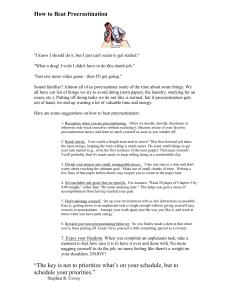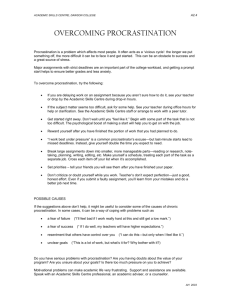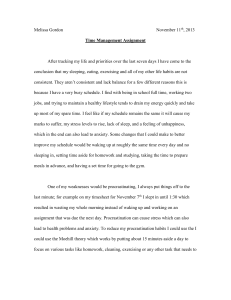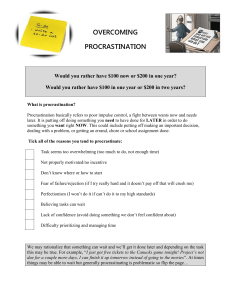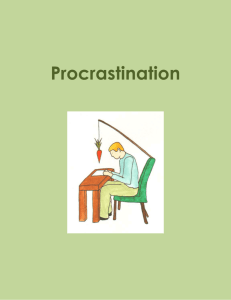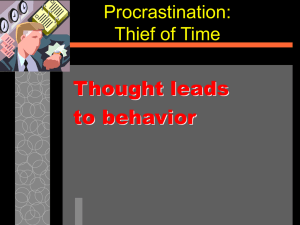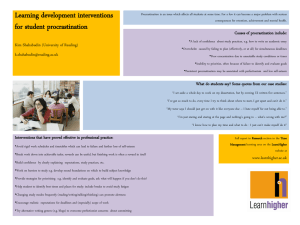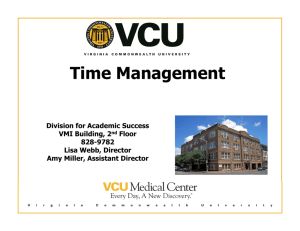Procrastination & Time Management
advertisement
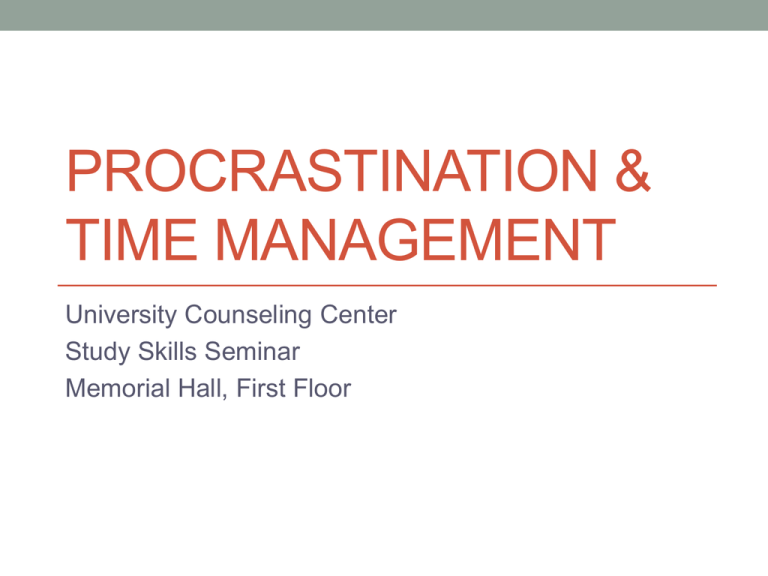
PROCRASTINATION & TIME MANAGEMENT University Counseling Center Study Skills Seminar Memorial Hall, First Floor University Counseling Center (UCC) • Memorial Hall 102 • Hours: • M, T, W, Th 8:00 a.m.-5:00 p.m. • Friday 8:00 a.m.-4:30 p.m. • (309) 298-2453 • www.ucc.wiu.edu UCC services • Individual Counseling • Assessments • Group Counseling • Psychological • Career Counseling • Vocational • Academic or learning • Learning Disabilities skills assistance • Outreach Programming • Academic Instruction • Standardized tests • Consultation • Training of Graduate Students / Interns TODAY WE WILL COVER: Procrastination Time Management PROCRASTINATION Procrastination • Procrastination is engaging in something other than what you really need to be doing to reach your goals or to accomplish an important task Procrastination • Not defined by the behavior you are doing at the time, but rather by the purpose of that behavior • Not surprising to hear that students who report higher levels of procrastination, tend to have lower grades HOW DO YOU PROCRASTINATE? Forms of procrastination: Common behaviors & activities • Watch TV, especially Netflix • Listening to the radio • Talking on the phone • Hanging out with friends • Going to the gym • Surfing the Web—Facebook anyone? • Doing laundry • Writing letters/checking e-mail • Reading magazines/books Why do people Procrastinate? • Fear of Failure • Fear of the Unknown • The task is overwhelming • Fear of looking foolish Some other common reasons: • Poor time management • Difficulty concentrating • Personal problems • Finding the task boring Why do you procrastinate?? • Need to be honest with yourself and recognize the reasons • Whatever the reason, identify what exactly is interfering with your getting started. NOW THAT WE HAVE SOME IDEAS OF WHY WE MAY PROCRASTINATE, NOW WE CAN START THINKING ABOUT HOW TO OVERCOME THIS PROCRASTINATION Address the Cognitive Distortions • Address the irrational beliefs and cognitive distortions up- front • Easy to estimate the actual time it takes to complete a task by keeping track of time • You will be no better motivated in the future than you are right now Challenge your cognitive distortions • It is not hopeless • It is not too late • You have the ability • You can’t do it later • You will not perform better under pressure Organization • Use a planner/appointment book • Work backwards from the due date • All tasks can and should be broken down • Keep track of activities and dates • Start every day with a review • Keep track of time relative to your due dates • Keep it Up-to-date from the start • Keep a Daily To-Do list Procrastination could be a signal… • That you have taken on too much! • College presents many opportunities to get involved both inside and outside the classroom. • Many professors will offer an extension to a good student who has more things due in a week than is reasonable. (but don’t wait until the last minute) Procrastination strategies • Realistic goal setting • Plan to work, Plan to play • Self Discipline Finally. . . • If you need help- get it! • University Counseling Center • Get a tutor • Ask a classmate TIME MANAGEMENT Time Management • Time wasters? • Netflix • Hanging out with friends • Playing video games • Eating/drinking • Etc. Benefits for Managing Your Time • Improve academic performance • Time management can help you: • Stop procrastinating • Accomplish more during the day • Have more free time! • Feel less stressed Ways to make the best use of your time (warning: there are 19) • 1. Use short and long term schedules • 2. Set daily priorities and focus on top-priority items one at • • • • a time 3. Do not over-schedule! 4. Plan your day so you are studying when you are most alert and attentive 5. Use 5-10 minute blocks of time you have to complete task or make progress on larger project 6. Use travel time efficiently & productively Ways to make the best use of your time • 7. Make sure notes & study materials are organized & • • • • easy to access 8. Begin projects with the intention of completing them 9. Say “no” to requests that interfere with accomplishing your goals 10. Study where you are not likely to get distracted or interrupted 11. Complete low priority tasks when you are least alert and attentive Ways to make the best use of your time • 12. Videotape your fav. T.V. shows and watch them later • • • • when you can skip the commercials 13. Use relaxation and enjoyable activities as rewards 14. Learn to stay focused & attentive so you don’t have to repeat tasks 15. Delegate tasks and responsibilities whenever possible 16. Prepare the night before for the next day Ways to make the best use of your time • 17. Run errands efficiently • 18. Delegate tasks and responsibilities whenever possible • 19. Prepare the night before for the next day Task Management (To-Do Lists) • Prioritize the tasks you want to complete • A: Very important task • B: Somewhat important task • C: Not very important task • Remember that priorities can change throughout the week • Be flexible & ask yourself “what is the best use of my time right now?” Summary • Procrastination • Address and challenge your cognitive distortion • Be organized • Set realistic goals • Time Management • Prioritize your time • Decide what is more important • Be flexible
